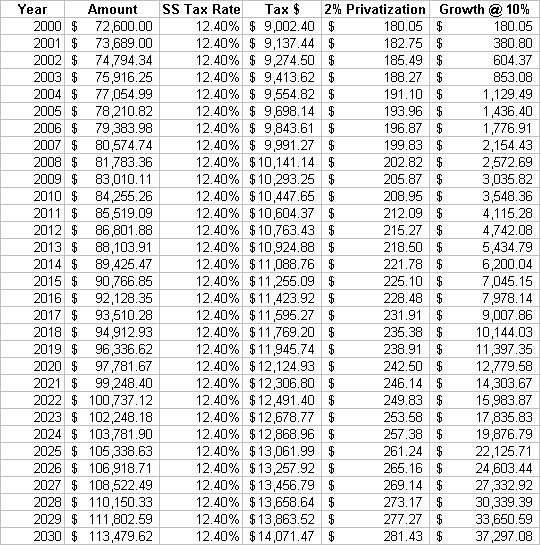
During the 1935 Congressional debate, it was stated unequivocally that Social Security tax contributions were never to be more than 2% of "base wages" which in 1937 was $3,000 per year.
In addition, to protect the privacy of American Citizens, the Social Security number would never be used for anything other than the social security system purposes.
To offset cries about cost, politicians hit upon the idea that it would sound better if both the employee and the employer paid half the cost. Why the public failed to realize that the company or proprietor nevertheless had the total cost included in the operating expenses of any business has often made me wonder about the intelligence of our citizens.
During the past 70 years, these lies have been exposed. Now the social security tax on an individual is 12.4% of all wages and Schedule C profits up to a maximum of $72,600 in 2000. Moreover, "base wages" will increase each year according to the growth in incomes. Further, the 2.9% Medicare tax is in addition to the Social Security tax and has no limitation on yearly contributions.
One of the most enduring myths of Social Security is that a worker has a legal right to his Social Security benefits. Many workers assume that, if they pay Social Security taxes into the system, they have some sort of legal guarantee to the system’s benefits. The truth is exactly the opposite. It has long been law that there is no legal right to Social Security. In two important cases, Helvering v. Davis and Fleming v. Nestor, the U.S. Supreme Court ruled that Social Security taxes are simply taxes and convey no property or contractual rights to Social Security benefits.
As a result, a worker’s retirement security is entirely dependent on the political decisions of the president and Congress. Benefits may be reduced or even eliminated at any time. Given the program’s looming financial crisis, benefit cutbacks are increasingly likely. Therefore, the entirely political nature of Social Security places workers’ retirement security at considerable risk. Indeed, Congress has already arbitrarily reduced Social Security benefits of some groups of workers.
Moreover, because Social Security benefits are not a worker’s property, they are not inheritable. Moreover, despite language which purports to liken Social Security taxes as "social insurance contributions," the taxpayer has no property interest in any of the funds which are paid into the Social Security System.
Upon death, the only property interest the person's estate enjoys is a funeral benefit of $200. When was the last time you heard of a funeral that only cost $200?
Actually, upon one's death, all interest in the so-called "social insurance contributions" remains with the government trust fund.
Let's have a little honesty in government? At least this beggar is honest! Should we not demand any less of our politicians!

It seems to me that the government is being extremely stupid about trying to stop people from smoking. For if smoking and other diseases reduce the average life-span of citizens, the government social security system would be money ahead if they died sooner rather than later. Yet we fund the National Institutes of Health with billions each year to increase the average life-span.
In contrast, a privatized Social Security system, based on individual accounts, would provide workers with the benefits and the safeguards of true ownership. According to several think-tanks and George W. Bush, the time has come when the Social Security system needs to be fixed.
Even President Clinton has stated that the federal government surplus should be used to shore up the Social Security Trust Funds. Of course, with interest rate trending upward, the federal government's surplus is rapidly shrinking as its cost of borrowing also heads upward and the average length of maturity decreases.
Presidential-hopeful Al Gore has flip-flopped on the issue again about privatization. Just two years ago, he suggested that taxpayers could put a small amount of their tax funds into a private retirement account. But when George W. Bush came out with almost the identical plan just recently, Gore labeled the plan as "risky."
Bush's Privatization Plan would allow a taxpayer to put up to 2% of their Social Security contributions into a private investment account each year. I have serious doubts about whether the plan merits any further analysis. For after all, even if you make in excess of $72,600 per year, you are only to be allowed to invest $180.35 into your private investment account. Now, honestly, what difference does that really make in the great grand scheme of things.
At today's prices, that is about 4 shares of Microsoft, 1.5 shares of Intel, 2 shares of Cisco.
 Whoopee!
Whoopee!
I am sure that will add up in the next 30 years to a meaningful amount!
You might think so based upon the numbers being floated around and their dishonesty about the actual federal deficit. But that is another story! Let's look at the possibility for Bush's proposal for a person already earning $72,600 per year. This is less than 30% of the population.
The following table shows what the Bush Privatization Plan might amount to over a 30 year span for any person earning the maximum amount for Social Security (assuming the wage base increases @1.5% per year) and earns 10% tax-free each year on the amount invested in the private investment account.


But then, maybe, Bush has proposed this strictly to get the camel's nose under the tent!
The returns to the vast majority of the population who would take advantage of privatization as espoused by Bush has to be significantly less than shown above.
So until a better solution is devised that enables covered individuals to put meaningful amounts into these private investment accounts, I think we had just better ignore the Bush/Gore(?) privatization proposals.
But then - - 'Tis Only My Opinion!
Fred Richards
June 2000
Corruptisima republica plurimae leges. [The more corrupt a republic, the more laws.] -- Tacitus, Annals III 27
This issue of 'Tis Only My Opinion was copyrighted by Adrich Corporation in June 2000.
All rights reserved. Quotation with attribution is encouraged.
Tis Only My Opinion is intended to provoke thinking, then dialogue among our readers.
![]()
![]() 'Tis Only My Opinion
Archive Menu
'Tis Only My Opinion
Archive Menu
Last updated - July 3, 2008